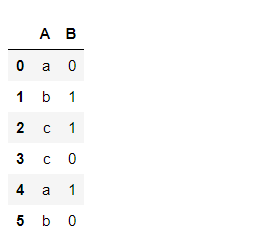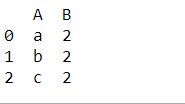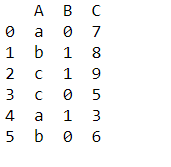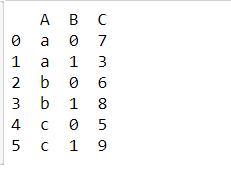在Pandas数据框架中对分类变量进行分组
首先,我们必须了解什么是pandas中的分类变量。分类是python的pandas库中的数据类型。一个分类变量只接受一个固定类别(通常是固定数量)的值。一些分类变量的例子是性别、血型、语言等。与这些变量的一个主要区别是,不能对这些变量进行数学运算。
在pandas中可以使用Dataframe构造函数创建一个由分类值组成的数据框架,并指定dtype = “category” 。
# importing pandas as pd
import pandas as pd
# Create the dataframe
# with categorical variable
df = pd.DataFrame({'A': ['a', 'b', 'c',
'c', 'a', 'b'],
'B': [0, 1, 1, 0, 1, 0]},
dtype = "category")
# show the data types
df.dtypes
输出:
这里有一件很重要的事情,就是每一列产生的类别是不一样的,转换是逐列进行的,我们可以在这里看到。
输出:
现在,在一些工作中,我们需要对我们的分类数据进行分组。这可以通过pandas中的groupby()方法完成。它返回所有的groupby列的组合。与groupby一起,我们必须传递一个聚合函数,以确保我们在什么基础上对变量进行分组。一些聚合函数是mean(), sum(), count()等。
现在应用我们的groupby()和count()函数。
# initial state
print(df)
# counting number of each category
print(df.groupby(['A']).count().reset_index())
输出:
dataframe
按列’A’分组
现在,再举一个使用mean()函数的例子。这里A列被转换为分类,其他都是数字,根据A列和B列的类别计算平均值。
# importing pandas as pd
import pandas as pd
# Create the dataframe
df = pd.DataFrame({'A': ['a', 'b', 'c',
'c', 'a', 'b'],
'B': [0, 1, 1,
0, 1, 0],
'C':[7, 8, 9,
5, 3, 6]})
# change tha datatype of
# column 'A' into category
# data type
df['A'] = df['A'].astype('category')
# initial state
print(df)
# calculating mean with
# all combinations of A and B
print(df.groupby(['A','B']).mean().reset_index())
输出:
Dataframe
按’A’和’B’两栏分组
其他聚合函数也以同样的方式使用groupby()实现。
 极客教程
极客教程




